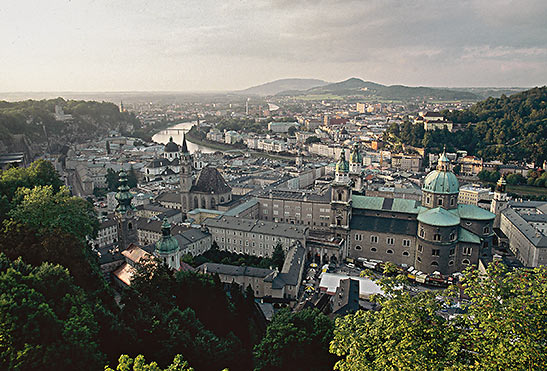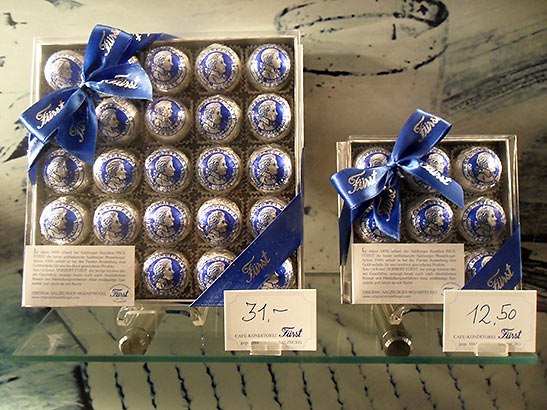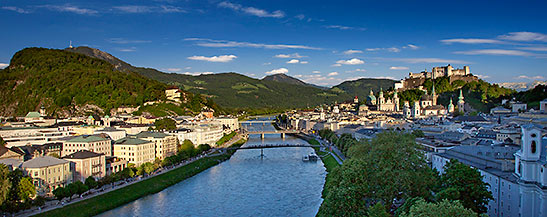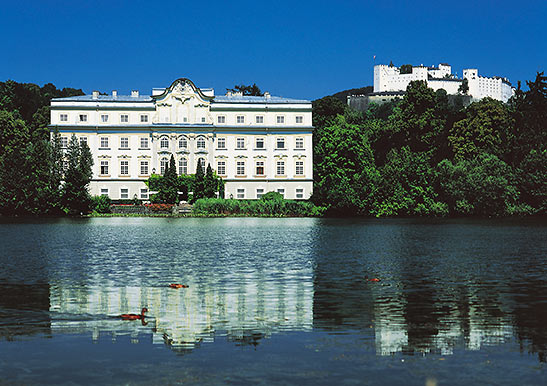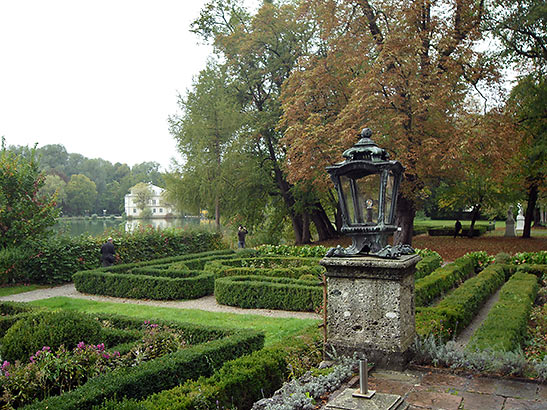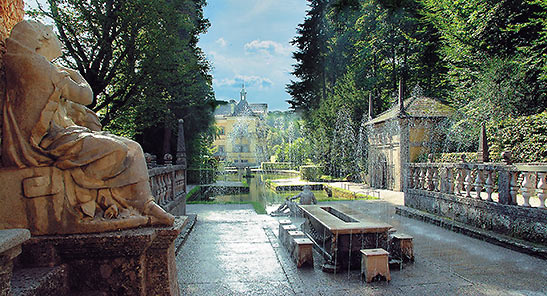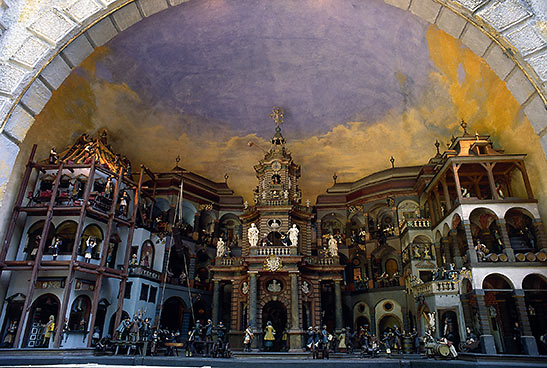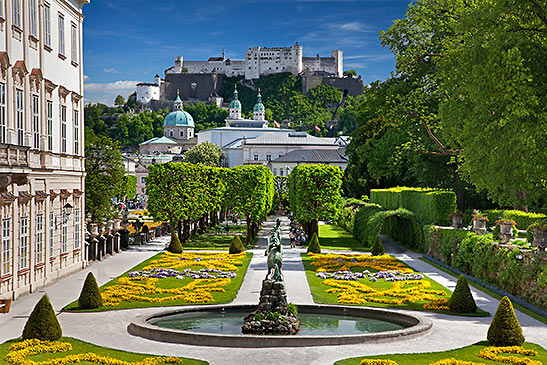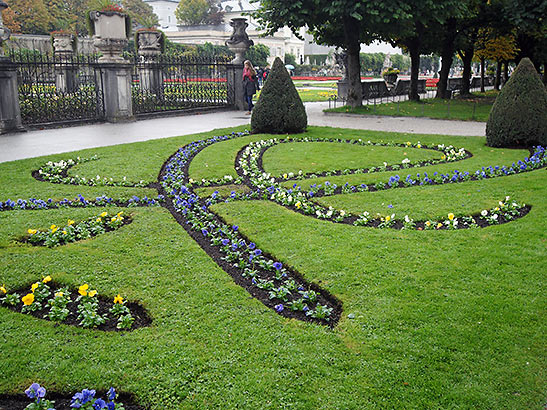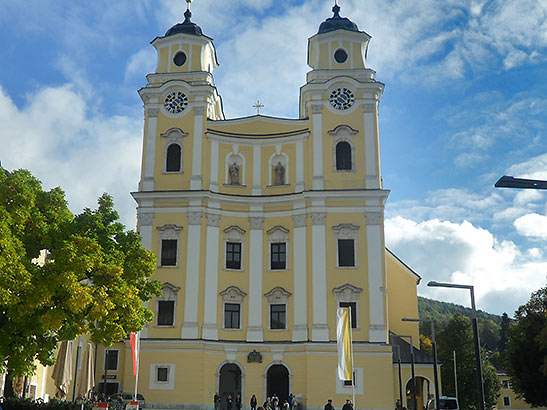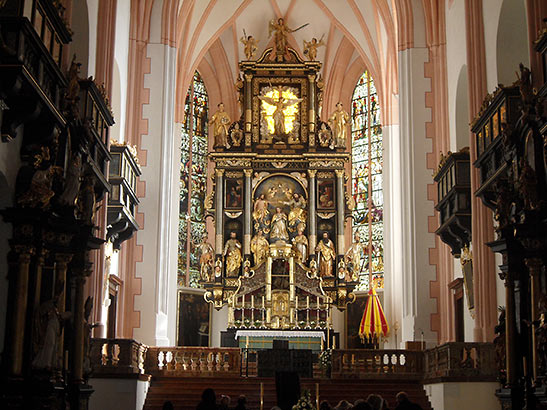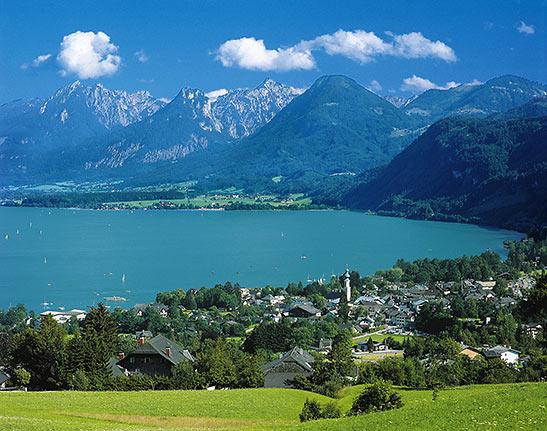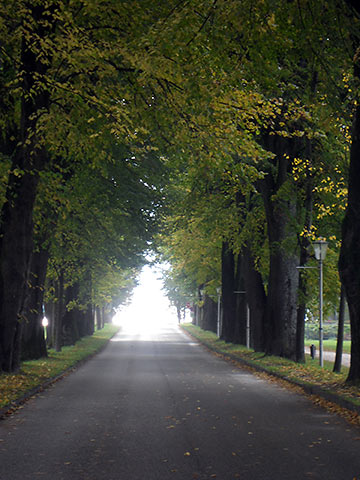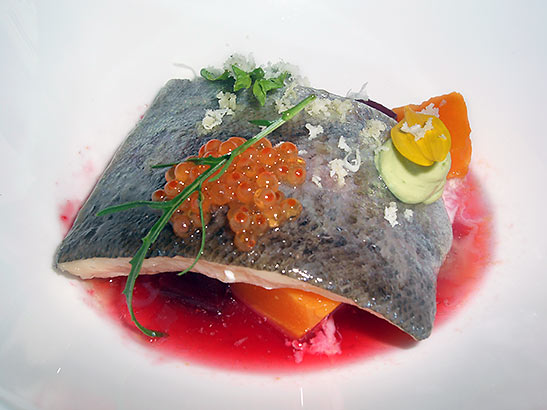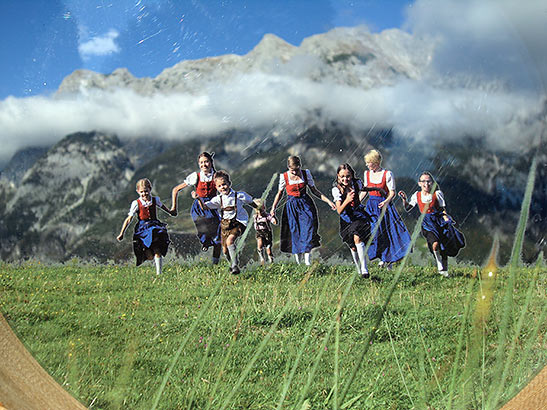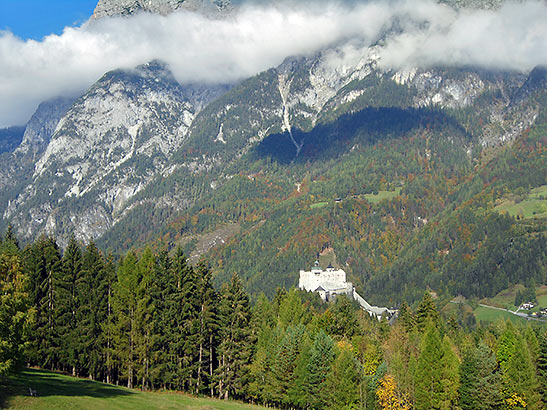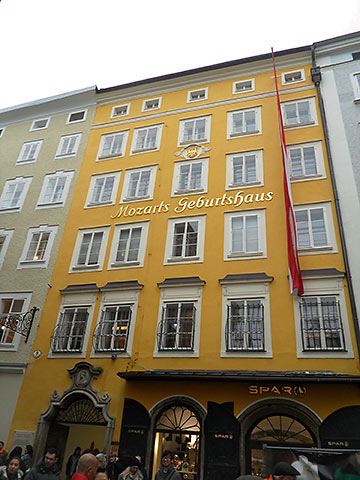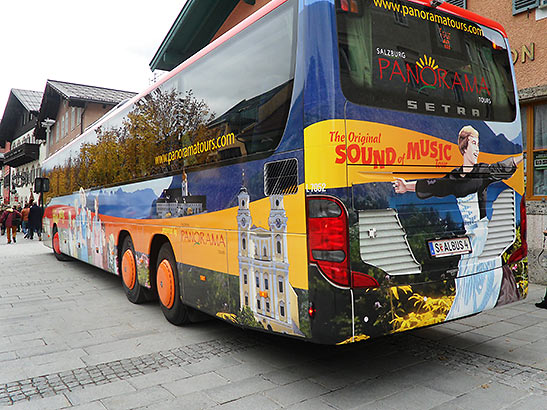 |
 |
|
 |

|
The Sights (and
Sites) of Salzburg And The Sound of Music
Story by Ruth J. Katz
Yes, Maria von Trapp (née Kutschera), at least as portrayed by Julie Andrews in The Sound of Music, courtesy of Rodgers & Hammerstein, had a lot of other favorite things – like raindrops on roses, cream-colored ponies, silver-white winters, and so on – but I am content with my favorite things; and I might add to that list, the legendary, local bonbon, the Mozartkugeln, with its hints of pistachio, marzipan, nougat...umm, umm good.
Named for the musical genius who was born here in 1756 (and who died at the too-young age of 35), these confections are best savored in the city where Mozart himself wove notes into tapestries of musical brilliance. Salzburg has much to offer besides Mozartkugeln and The Sound of Music, although The Sound of Music is definitely a part of the city's DNA; for that reason, since the 50th anniversary of the film was being feted, I had come to join in the celebrations of that milestone, which included a wondrous gala at that same Felsenreitschule. Some of the original "children," now adults, were in attendance; and a fresh troop of child actors, would-be von Trapps, were part of the gala event, as well, all singing legendary tunes from the score. Arguably, one of the top-grossing half-dozen or so films of all time (when adjusted for inflation, of course), the film's Austrian locales act as a magnet for some 300,000 tourists a year, all eager to relish the magnificence of this cinematic Mecca, reliving the celluloid romance and drama. I am but one pilgrim, come to see the sites, sights, and sounds of the film, as well as to view the actual places where the von Trapps flourished.
Tiptoeing into the sleeping city in the early morning hours, after the overnight flight, I spied an old-fashioned, flat-bed, wooden, horse-drawn cart, driven by a lederhosen-clad driver, who was delivering large metal containers to local eateries – but these were not vats of milk, but rather, barrels of beer! I knew I was not in Kansas any longer. My first stop was the rococo Leopoldskron Palace (Schloss Leopoldskron), just outside Salzburg. It is a site used for many scenes in the movie. A press conference had been convened to honor the film, and in attendance were, again, some of the child actors from the film; Johannes von Trapp, the youngest of the real von Trapp children, who was born after the family left Europe; and local dignitaries. The palace was built by Leopold Anton Freiherr von Firmian, the Prince Archbishop of Salzburg, and it was opened in 1736. Currently, it's a rather elegant meeting and seminar facility as well as a hotel with 12 elegantly appointed suites in the original palace, 55 rooms located in the adjacent Meierhof building, and two spacious townhomes for your home-away-from-home accommodations.
A Scottish Benedictine monk, Bernhard Stuart, is regarded as Leopoldskron's master builder, but it is one of its later, prominent owners – theater impresario and director Max Reinhardt – who is likely the most famous name associated with the palace. Reinhardt is credited with co-founding the world-renowned Salzburg Festival, among other accomplishments. (The celebrated festival today is responsible for bringing into the city nearly 30 million Euros annually in ticket sales alone.) Reinhardt's favorite spot in this manse was his library, with richly burnished wooden shelves and cases housing some 15,000 volumes; Reinhardt had the library built to loosely emulate the extraordinary library in the Abbey of Saint Gall in Switzerland. The theatrical entrepreneur was forced to leave his beloved home after the Anschluss in 1938, keenly sensing impending danger and while he always intended to return to his treasured domicile, he died in America in 1943. It was in the lakeside back yard of the palace that the von Trapp children and Maria inadvertently tipped their canoe and fell into the drink in the film. The amazing first-floor Venetian Room was more or less replicated in Hollywood for a ball scene in the movie, replete with gilded mirrors and golden wall décor. Perhaps most noteworthy, the well-known gazebo or music pavilion (where Liesl and Rolf sang their duet "Sixteen Going on Seventeen") was also located on the grounds at Leopoldskron, but because of heavy tourist traffic, it was moved to the Hellbrunn Palace. (It is an interesting footnote, worth mentioning, that Reinhardt's son Wolfgang bought the film rights to Maria von Trapp's story in the mid-50s and made a German film of her life. Then a Broadway show was mounted, and ultimately, the Hollywood movie.)
The Hellbrunn is a magical place, indeed; while it was not a backdrop for the film, it is a site worth visiting, if you are stopping by to see the gazebo. Built in the early 17th century by Markus Sittikus von Hohenems, Prince Archbishop of Salzburg, it is dotted with hidden fountains; Sittikus apparently had quite a sense of humor and had outdoor, stone dining chairs outfitted with hidden water fountains that could spray the seats of unsuspecting guests as they are dining!
As you walk around the grounds and also view the grottoes, watch out for more hidden sprinklers! At each secret fountain there is always a single dry spot, where the Archbishop himself always stood, out the line of fire of the spraying mists. The grottoes (built later in 1750) are charming that feature fascinating, mechanical, musical/theatrical stages, with some 200 automata that represent various professions, and as they move and sway and gesticulate, they delight viewers of all ages; each little scene is captivating and charming.
The vibrantly hued Mirabell Gardens in town were used peripherally only in the "Do-Re-Mi" sequence, but they, too, are worth more than a mere look-see.
Exquisitely landscaped, the gardens date back to 1606, when Wolf Dietrich von Raintenau built them, then named Schloss Altenau, as a tribute to his beloved. The gardens were later renamed Mirabell by the same Markus Sittikus. Among the luscious appointments in the gardens are the Grand Fountain, the Pegasus Fountain, the Rose Garden, the Dwarf Garden, the Hedge Theater, and the Orangery.
The nearby Nonnberg Abbey, still an active convent today and where Maria von Trapp became a novice in 1924, does not allow visitors, but you can attend services in the abbey's Gothic church, where Maria and Georg von Trapp were actually married; in the film, however, they celebrated their nuptials in the quaint village of Mondsee, where St. Michael's Basilica stands on the grounds of the Mondsee Abbey. Constructed in the mid-15th century, the church features a Baroque façade, which provides counterpoint to its Gothic origins.
On the way to Mondsee, pass through the Lake District (Salzkammergut) and enjoy the verdant views from Lake Fuschl and Lake Wolfgang, where some movie scenes were filmed.
Not far from the church is an allée, formed by regal trees, lining the roadway. This is the thoroughfare where Captain von Trapp and the Max Detweiler character drove, noticing playful "urchins" in the trees, not realizing they were the little von Trapp children, frolicking in a manner that the baron would never have permitted. About 30 miles south of Salzburg, in the countryside of Salzburgerland, we dined in the typically Austrian village (population 3,000) of Werfen, at the lovely Restaurant Obauer (which also has hotel rooms, so you can drink freely and not worry about driving back to a hotel). We feasted on local trout with beetroot; deer ragout crepes; and mouth-watering blueberry compote. All was accompanied by von Trapp Family Lodge wines from Weingut Höpler, the exclusive purveyor to the family lodge.
At the tourist office in Werfen, you can get info about hiking The Sound of Music Trail (just a bit more than three-quarters of a mile and about an hour's easy trek), which opened in the fall and which features five stations including the gateway – the magic cube, the plateau near a pond (with benches for a rest), the music roll, and the Gschwandtanger plateau and picnic area, where Maria and the children dined al fresco in the movie and where she taught them "Do-Re-Mi." There is a "trick" little viewing station here, in which you can magically see Maria and the von Trapp children romping.
And if you want to sing here, and sound like a local by yodeling, just should out, "My little old la-aa-dy" in a slight singsong and you'll have mastered a neophyte's yodel. Note that from this tranquil meadow you can spot Hohenwerfen Castle, and I might add, some of the most striking, heartbreakingly splendid scenery I have ever viewed.
You may also want to add a few other stops on your cinematic-location trip: Aigen, where the actual von Trapp homestead stood and a pass-by of Schloss Frohnburg (Frohnburg Palace). The castle served as the exterior of the von Trapp home, where, upon his return home from a trip, the baron tore down a Nazi flag affixed to his front door. Prancing down a tree-lined roadway, outside the castle, Maria sings "Confidence," as she makes her way to the von Trapp home for the first time. Lastly while it is not related to The Sound of Music, but is assuredly associated with the sound of Austria's music, visit Mozart's birth place (at number nine, Getreidegasse , now one of Salzburg's most popular shopping streets) and not far from there, the home where he later lived, Tanzmeisterhaus, the family residence from 1773 on, which was reconstructed 1996. If he were alive 50 years ago, when the film debuted, would he have liked the movie and the music? One can only guess, but assuredly, he would have liked that the hills were alive with music.
The Details: For a pleasant and relaxing trip to and from Austria, fly Austrian Airlines Business Class; service is superb, flat beds are comfy (just over six feet long), and the lounges at both departure points – North America and Austria – are well equipped with the amenities a traveler needs and wants. On board, there is a Flying Chef so meals are scrumptious, assuredly a cut above the competitions' offerings; additionally, in the most reverent homage to the airline's home base, food service includes the Coffeehouse in the Sky – a java menu that features nearly a dozen different variation on Joe, among them, the Maria Theresia, the Wiener Mélange, the Einspänner, and so on...all delectable, creative twists on the bean that you might find in a Viennese coffeehouse, such as at the celebrated Café Landtmann. Sound of Music Tours are staged
by panoramatours.com. For general travel information: austria.info;
salzburg.info;
salzburgerland.com ©2016 Ruth J. Katz; all rights reserved. Related Articles: |
|
|
This site is designed and maintained by WYNK Marketing. Send all technical issues to: support@wynkmarketing.com

|






 hen
speaking of dreamy, jewel-like Salzburg, these are a few of my favorite
things: The extraordinary Hotel Sacher (not to mention its eponymous
Sacher Torte which just might harden your arteries in a before the next
heartbeat); the evocative Summer Riding School, or the Felsenreitschule,
with its open-air, carved-into-rock architecture; the extraordinary
trick fountains (jeux d'eau) of Hellbrunn Palace; and the views
from the Gschwandtanger outside the city in Salzburgerland.
hen
speaking of dreamy, jewel-like Salzburg, these are a few of my favorite
things: The extraordinary Hotel Sacher (not to mention its eponymous
Sacher Torte which just might harden your arteries in a before the next
heartbeat); the evocative Summer Riding School, or the Felsenreitschule,
with its open-air, carved-into-rock architecture; the extraordinary
trick fountains (jeux d'eau) of Hellbrunn Palace; and the views
from the Gschwandtanger outside the city in Salzburgerland.